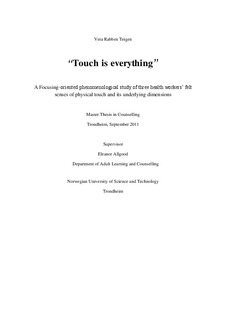| dc.description.abstract | This study has its starting point in physical touch, and I interviewed three health workers; an osteopath, a nurse, and a midwife, about their sense of touch. The data collection method used is the qualitative research interview, with its main emphasis on Eugene Gendlin‟s Focusing (1981), to capture the informant‟s embodied sense of touch.
The Constant Comparative Method from Grounded Theory by Strauss and Corbin (1990) is employed to analyse the data, supplied by the descriptive phenomenological method as developed by Giorgi (2009), and inspired by Gendlin‟s Focusing (1968; 1970; 1981).
Two main themes and a core theme emerged from the data: 1) "Touch is everything" – The toucher and the touched, 2) "Touch is an art" – The space between and, 3) "It takes courage to be close" – Touch as a meeting between selves.
Philosophical theory and humanistic existential counselling psychology theories are at the base of the discussion. This includes Merleau-Ponty (1945), Gendlin (1962; 1996), Buber (1970/1996), Rogers (1961/2004) and Josselson (1996). Theories on body, space, and touch, also in counselling, are represented by Gendlin (1993; 1992), Montagu (1986), Hall (1966/1990), Hunter and Struve (1998), Tune (2001) among others.
The study shows that positive touch is important to the person, how touch is more than physical, that the body is more than a physiological machine, and how touch both happens within different types of space and creates a meeting between the selves that reside inside the bodies. It also shows how through providing certain empathic conditions; warmth, acceptance, listening and caring, a health worker or counsellor can ensure a good meeting that can potentially lead to a dialogical I-You meeting. This meeting, based on the empathic conditions provided by a counsellor who is also in tune with him or herself, may also lead to change in the both the counsellor‟s and the client‟s selves. | nb_NO |
